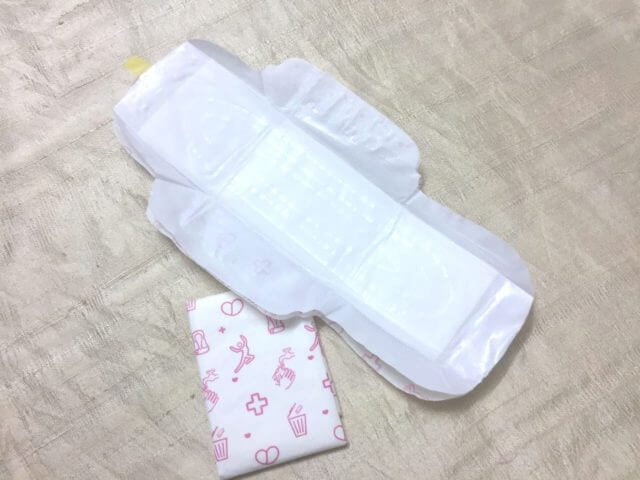In this era of environmental consciousness, people have started making the switch from disposable to non-disposable and reusable in every frame of life- even with regard to menstrual hygiene.

Back to the Basics
Brands like EcoFemme (based in Auroville, Tamil Nadu) has employed local support to go back to the old tradition of sewing together layers of cloth to make a sanitary napkin that can be washed and reused, like how it used to be in the time before disposable sanitary pads entered the market.
While this has been hailed as a bold move towards reducing the amount of junk that goes into landfills on a monthly basis and also has the vociferous support of celebrities (such as Tillotama Shome, of A Death in the Gunj and Qissa fame), it also raises several questions with regard to how hygienic it is to wash and reuse the same sanitary pad.

Breeding Ground for Bacteria
It is common knowledge that bacteria flourishes in moist environments, and it is for this very reason that disposable sanitary napkins came into being- to reduce the risk of infection in menstruating women and to ensure hygiene during the menstrual cycle.
High Maintenance
All one needs to do is dispose of a used pad in a safe and clean manner and take a new one. Cloth pads require a lot of maintenance- besides thorough washing on a daily basis, they need to be boiled in hot water every once in a while to kill any residual bacteria. However, even boiling is not a 100% guarantee of safety.
How Sustainable are They in Reality?
This raises the question of how sustainable these cloth napkins really are. While the websites selling them insist that they can be used for up to 5 years, it is imperative to remember that a LOT of bacteria can breed within the folds of cloth in that time.
Considering such practical factors, it is my observation that cloth pads actually last a lot less than five years- they can be safely used only for about five to six months at the most.
Read More: Simple Tips To Handle Relationship Problems
Unsafe Trials
Even though cloth pads are harmless to the environment, it is often tricky to find the “right one.” While there IS the option of getting them tailor-made to your measurements (however, most online portals do not offer this service, so it would have to be done by the individual), some stores have been known to allow non-menstruating women TRY ON THE CLOTH SANITARY NAPKINS before purchase.
Needless to say, if unpurchased, it is a huge health threat to the person who actually ends up buying it.
Another reason why cloth sanitary napkins might not be hygienic is because most of them are made by recycling old cloth- and there is no guarantee that this cloth was washed or disinfected before being used to make a sanitary pad, and could quite likely be carrying a lot of bacteria (thanks to the previous owner).

Chemicals in Disposable Pads
The argument used against disposable sanitary pads is that not only do they pollute the environment by taking a very long time to decompose once discarded, they also contain certain materials which are harmful to the human body, such as styrene (used in car tyres), chloromethane (used in petroleum refining), acetone (used in nail polish remover), and chloroethane (used in styrofoam).
The general public is not usually aware of this because these components are rarely listed on the packaging.
The advantage of cloth sanitary napkins seems to be that in addition to being eco-friendly, they do not contain any such harmful chemicals. However, one must be very vigilant and particular with regard to their maintenance and also replace them as and when needed to avoid health complications that could arise due to prolonged contact with a surface that could contain bacteria if not kept clean.
In conclusion, it can be said that while the usage of eco-friendly cloth sanitary napkins is a positive move towards reducing the garbage in landfills and improving the environment, whether it works personally depends on how committed the user is towards hygiene.
If they do not have the drive to keep their pads meticulously clean and regularly washed and boiled, they are putting themselves at serious risk. It is better then that people leading busy lives, who don’t have the time to care for these relatively high maintenance cloth napkins stick to using disposable pads.
Image Credits: Google Images
Sources: EcoFemme, Menstrual Cup Reviews, Happy Eco Period
More Recommendations:
B-Town Writer Apurva Asrani Gets Bell’s Palsy, Shares Through A Brutally Honest FB Post




































I am sorry to say you do not seem much informed on the argument; actually, you’re not informed at all.
Cloth pads last for years (mine are 10 years old), do not need boiling (do you boil your underwear???) and are not made with old rugs (this is simply absurd). You simply use them, then rinse them with cold water,l and throw them in a bucket: at the end of the period they go into the washing machine with other laundry, 60 degrees, and are perfectly clean. Since I started to use them, I had no more bad smells, no more yeast infections, no more irritations – and I am not the only one. When a woman tries cloth, never goes back to disposable.
lol at the girl above! my mom who grew up in the countryside and in poverty said 15 years ago: “Plastic pads are the best invention ever! I used clothing pads, and they would always start smelling and leaking.” So bsaically, it’s a myth that clothin pads are the uber best super duper thing. I don’t have anything against people who use them, but I hate it how nobody tells you that bacterias breed easily in the cloth. Also I hate how people who push thing are super angry and tell you that you’re not informed
I once used an improvised cloth pad in emergency situation and I am so thankful I was born in the era of whisper. Those who are saying sanitary napkins are polluting the environment, let them first ban car tyres, nail polish removers and styrofoam. Then we can talk about napkins. We are using many things which aren’t necessity. But sanitary napkins are a girl’s best friend. Of course now many women are advocating silicon cup. I fainted at the mere thought. No thanks. And yes my mom shared with me how dreadful it was to wash the cloth with menstrual blood and reuse them.